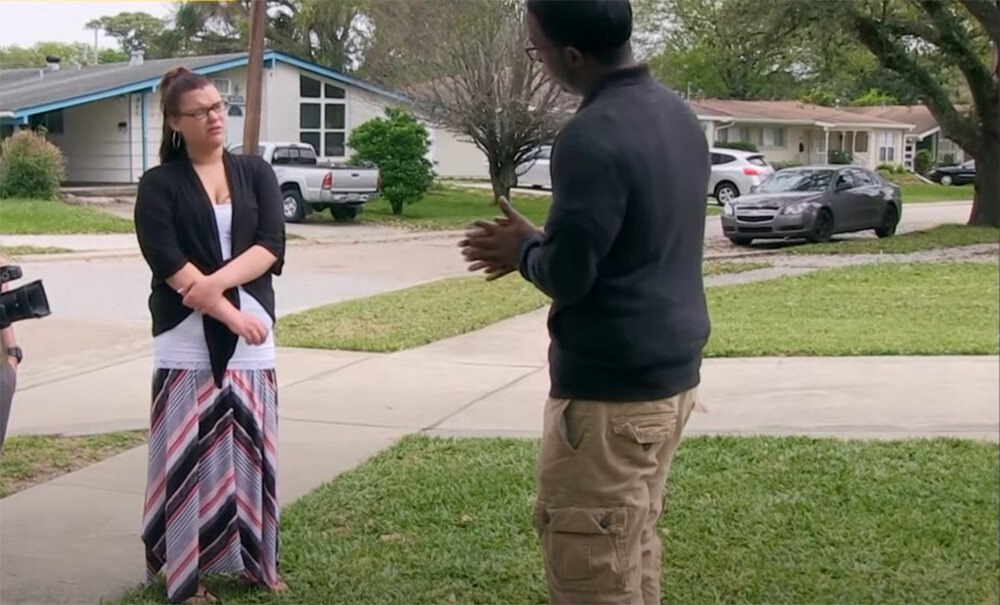The Unexpected Heart Beating Inside MTV's 'Catfish'

When we think of important television that moves humanity towards a greater understanding of why we're all such beautiful little nightmares, we generally think of Serious Drama. To plunge the depths of the human psyche, you need sexy mood lighting, scenes where characters soulfully smoke cigarettes under the stars, and a script fine-tuned by depressed writers who fall asleep crying to TikToks about the housing crisis.
While plenty of TV shows are entertaining enough to lull us into a stupor that helps us forget all the times we said "you too" after a movie theater employee told us to "enjoy the movie," very few teach us how to treat each other without feeling like a school special. For this very reason, MTV's Catfish stands out as a rare gem in a sea full of garbage.
Don't Miss
How does a show that spends hours showcasing people's Myspace pages teach us anything except to log off and trust no one? Well, when it's not giving viewers a tour of all the My Chemical Romance-inspired haircuts across America, Catfish demonstrates how to hold space for each other in ways that few television shows have ...
The Guests Aren’t Automatic Punchlines
Obviously, Catfish is a reality show, which means its subjects get memed into oblivion. We, as a culture, love to make fun of people, particularly regular people who sign up to air their business on TV. Reality show contestants are often awkward, willfully oblivious, and sometimes pathologically selfish, and the way producers cut these shows makes it criminally easy to turn people into bumbling cartoon characters or churlish villains with no context for their lives. And while the internet's fandom and discussion of Catfish does not have clean hands, the show's ultimate goal is apparently to give people answers and resolution, not to make them fight.

MTV
Where many reality shows introduce people with choreographed sequences where guests pose beside a wall of snappy catch-phrases (never forget the glory of MTV's Next), Catfish gives us a long slow introduction to each guest. The episodes open with an email from the hopeful romantic, where they describe the nature of their relationship and why they're willing to risk public humiliation for it. We continue to get to know them through a Skype or phone call with Nev Schulman where he asks them questions like: "Are you ready to find out the truth?" and "What makes this person special?" and "Please, for the sweet love of God, can you people start reverse image searching on Google, it's 2021?!"
Rather than immediately roasting people for being infatuated with a stock photo that never video calls them, Catfish steeps us in the lives of people all over the country working different jobs. We meet their roommates and family members and get a sense of what their weekends are filled with, which automatically humanizes them regardless of how things end. While the show has impossible not to gasp-laugh moments, like when Keyonnah thought she was meeting rapper Bow Wow, but it was a woman Dee, aka Dee Pimpin, who bragged about reeling in ladies on the regular, it never sets out to humiliate guests in the way it could.
Other than admitting to wanting to meet Bow Wow.
The Show Holds People Accountable
Bad behavior is the bread and butter of reality TV (with the exclusion of our gentle late prince Bob Ross), and if we're being honest, no scripted show would go far without characters getting away with heinous behavior (sorry to Killing Eve's Villanelle - your perfect pantsuits won't protect you). But rather than pumping hapless lovers full of booze, manipulating bizarre confessions, or urging strangers to demonize each other, Catfish has always insisted on forcing people to face the harm they've done emotionally.
While the show gives each catfisher time to explain themselves and offers a safe mediated space for the victim and internet impostor to potentially make peace, it also maintains a keen focus on the emotional needs of the person being deceived. Few moments sum up the show's commitment to accountability as much as Max Joseph's rant at 43-year-old catfisher Marcus, who posed as a handsome tattooed 25-year-old named Lanus and proceeded to solicit nudes from 22-year-old Ari.
When Marcus unrepentantly admits he's catfished 40-50 women as part of a "social experiment" but then became "addicted" because his work schedule killed his social life, Max lets him have it. "Since we've been making this show, every girl or guy that's ever been in Ari's place fears that they're talking to some mid-40-something-year-old man who's sad, sitting home in his crusty boxers, typing into the computer. And you're that guy."
In a follow-up move of truly unhinged villainy, Marcus ignores Max's advice and attempts to propose to Ari the next day on the show. When she tenses up and refuses, Max jumps in to hammer in the point: "Even if she wanted to, I wouldn't let her. Period. There's going to be no future with her."
Where most reality TV shows would encourage and milk a toxic and predatory engagement, Catfish attempted to intervene.
The Show Is Still Rooting For Love
If we're being honest with ourselves, Catfish would be nauseatingly boring if it primarily starred earnest couples meeting in-person for the first time. Most people don't want to watch couples smile at each other while they quote Riverdale and eye-bang in a Starbucks, and if you do, please email me your secrets to a happy life. The lies are truly the spice of Catfish, and speculating on the webs of fake identity gives viewers something to do while we put off mopping the kitchen or figuring out what health insurance even is (it's just legal scamming, right?!) However, despite all the juicy twists, it seems like the show wants love to win much more than having an episode dedicated to a flaming trash fire.

MTV
In a show purely hinged off humiliation, drama, and a disregard for people's feelings, there wouldn't be the dedication to honesty and reconciliation that Catfish demands. When the catfish is revealed, whatever their story is, they neither get off the hook easily nor do they get tossed aside without a chance to show who they are.
Because of this atmosphere of openness, there are episodes with surprisingly wholesome endings. One of these pure moments took place at the end of season two when 21-year-old Lauren went to meet 23-year-old Derek, a crush she'd been talking to on MySpace over the course of eight years. In a rare turn of events, Derek ended up being true to his identity and admitted to shyness about using technology. After the episode aired, they ended up getting engaged, and while they're no longer together, it was a drop of hope in an otherwise barren desert of lies and fake love.
In another episode with a happy ending, a smitten woman named Colleen met her catfish Tony and soon discovered he was a Black man named Jeremy. Throughout the course of their online relationship, Jeremy had been posing as white because he felt self-conscious about racial stereotypes and was unsure how his family would react to the relationship.

MTV
While their initial relationship was built on a lie, Catfish facilitated the opportunity for them to get to know each other on a real basis. Jeremy ended up having a complicated conversation with his sister Meka about racial identity, while he and Colleen ultimately started a relationship that is still going to this day.
The Show Forces People To Stop Lying To Themselves
If The Wolf of Wall Street taught us anything, it's that lying and opportunism make the world go round. Lies, of all shapes and sizes, infect our air and water as much as plastic particles, and while corrupt governments, mega-corporations, and cheating partners (Justin Timberlake, your time will come) everywhere know this, that doesn't mean it's good for us.
It's easy to paint lying as a one-tier act, something that people intentionally do to hurt others, and in the context of Catfish, this is often true. Catfishers will concoct entire fictional universes in order to secure nudes, confessions of love, and even marital commitments from doting strangers. But one of the strengths of the show is that it showcases and calls out all the less obvious lies people tell, particularly to themselves. While the big reveal forces the hand of catfishers creating obvious lies, the arc of each episode forces the hopeless romantic to admit how many red flags they've overlooked, the goalposts they've moved for infatuation, and in many cases, the full-on denial they've embraced.
In one intense episode, Chelsea sets out to meet her online crush Charles from Plenty of Fish, only to discover she's been catfished by her best friend Domo. When asked for the reasoning behind the theatrical betrayal, Domo explains this was the singular way she knew how to express her true feelings: "I had a crush on you for almost two years now. I was scared, and I felt more comfortable being this guy, who I know you liked, who was your type. I want to see if you want to be more than friends."
To make matters more intense, Chelsea's not only living with Domo but sharing a bed with her at the time of this episode (Shakespeare is quaking in his grave at this drama). After finding out the truth, Chelsea quickly moves back home, and Domo is forced to accept that she couldn't devoutly hide her sexuality, nor could she trick her friend if she wanted to have healthy relationships. After the initial reveal, the two sit with Max and Nev to hash out boundaries in hopes of rebuilding the friendship. And while Domo's forced to get honest with herself about her desires, Chelsea has to stop lying to herself about red flags.
So while Catfish may be a show that regularly gasps at blurry nudes, shows us screenshots of people's drunken emoji-laden confessions, and features men convinced they're dating Katy Perry (even after he met the catfish he still thought Katy was waiting for him), it's also a show that models healthy and restorative ways of resolving conflict. At least, that's what I tell myself when I've been watching it for 10 hours.
Top Image: MTV
